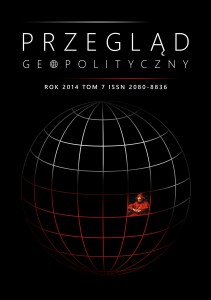ŁAD ŚWIATOWY W UJĘCIU KOSMOPOLITYCZNYM –STUDIUM KONCEPCJI DAVIDA HELDA
WORLD ORDER WITHIN THE SCOPE OF COSMOPOLITANISM - CONCEPT STUDY OF DAVID HELD
Author(s): Adam Rogala-LewickiSubject(s): Politics / Political Sciences, Political Theory, Globalization, Geopolitics
Published by: Polskie Towarzystwo Geopolityczne
Keywords: world order; cosmopolitanism; David Held;
Summary/Abstract: David Held is a theorist of political change and one of the most frequently cited theorists of globalization and cosmopolitanism . He created the paradigm of the modern age, which ended the era of the modern state, formed on the basis of the classic principles. Current globalization, as the Held stressed, is equipped with the characteristics of a distinct system. When describing it, Held uses such references as: spontaneous order, political emergence, self-organization. He reflects the phenomenon by such characters as: transnational interconnectedness, complex webs, networks of relations, evolving structure, process of structuration and stratification, dynamic global structure, patterns of inequality and hierarchy, patterns of inclusion and exclusion. Everything in the scope of the flow and interaction between the following actors: communities, states, international institutions, NGOs, multinational corporations - together forming global order. This phenomenon of globalization of policy means not only global interdependence but also reterritorialisation (new conditions of borders), deterritorialization (removal of the existing borders ), resulting in internationalization, transnationalization and institutionalization. The globalization of policy must lead to a change of transnational consciousness. It must stimulate the cosmopolitan sense of collectiveness and a sense of community across boundaries. Cosmopolitan means the same as for all, isomorphic, unifying, corresponding to the whole. Held is considered among the advocates of cosmopolitan democracy. He incorporate cosmopolitanism in the political sphere and believes that cosmopolitan ethics contributes to improving the standards of democracy. Contrary to international law, a cosmopolitan approach justifies giving the rights and obligations from the fact of being a citizen of earth, and not a particular state. Cosmpolitanism do not destroy national cultures but teaches respect for all of them. Global problems existing in extremely interconnected world can not be solved by one country. Held sees the need for institutions to solve of transnational problems and mitigate antagonisms in the international community that comes from particularistic approach. Concept of global governance is certainly not a scientific whim, but the result of real needs.
Journal: Przegląd Geopolityczny
- Issue Year: 2014
- Issue No: 07
- Page Range: 105-128
- Page Count: 24
- Language: Polish

